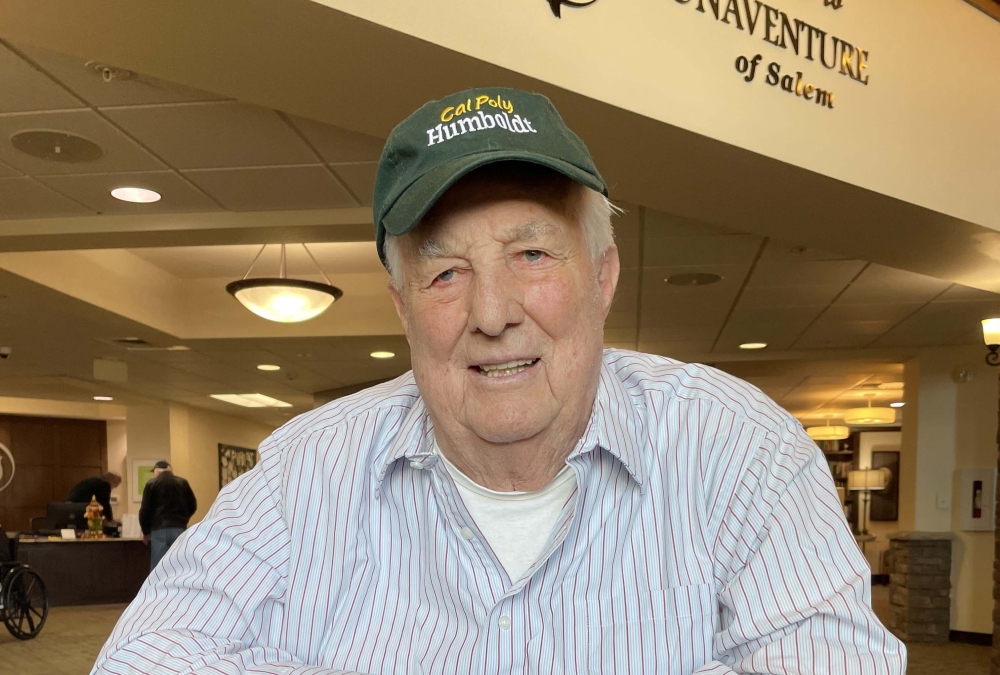Del Skeesick (‘61, Fisheries Biology, ‘63 M.S. Fisheries Biology) began working with fish at the Minnesota Labor Department of Fisheries in 1954. As part of the Brothertown Tribe at Fond du Lac, fish is integral to his life and culture.
After Minnesota, Del earned his bachelor's and master's degrees in Fisheries Biology at Cal Poly Humboldt. Now, hoping to inspire other Humboldt biology students in their fisheries research, Del recently established the Skeesick Family Humboldt Bay Fisheries Research Endowment with a $150,000 gift.
“I owe my success in fisheries to Cal Poly Humboldt. In gratitude, I have decided to give back to the institution by setting up an endowment that I hope will foster a generation of scientists who identify fish, delve deeper into the field, and explore practical approaches to habitat restoration and research. The practical application of knowledge is just as important as the ability to think ahead and learn new things,” Del says.
The fund will aid Cal Poly Humboldt Fisheries Biology graduate students in researching socioeconomically significant fish species in Humboldt Bay and nearby coastal waters. This support includes financial awards for research, equipment purchases, or other areas identified as the most pressing needs. Additionally, the fund will assist graduate and undergraduate Fisheries Biology students in attending professional society conferences.
As a graduate student at Humboldt, Del researched under Oceanography Professor James Gast. He gathered data for the flood zone in Humboldt Bay during the pre-fallout period of Russia's nuclear testing era.
As a Humboldt student, Del attended many society science professional meetings, including The California Chapter of the American Fish Society.
These meetings meant a lot to Del as they allowed him to learn about different scientific findings among other regional fisheries biologists and meet other scientists.
“Society meetings offer two benefits: You can learn new information and make friends with other biologists while enjoying a pint over a game of pool during off hours. These gatherings broaden your horizons and understanding. District biologists from small towns can meet biologists from other regions, learn about other areas, and widen their perspectives. As someone passionate about fisheries biology, I want to encourage Humboldt students to share their knowledge with other biologists. Sharing knowledge is the best way to ensure accurate information is available,” Del says.
As Del was going to school, his wife, Beryl Jean, worked as the secretary of the Cal Poly Humboldt Dean of Instruction. He says she loved Humboldt just as much as he did, if not more.
Del graduated from Cal Poly Humboldt with a wealth of knowledge in fisheries biology after his time in Minnesota. For the next 50 years, he served as a fisheries biologist, supporting Oregon's conservation and research efforts in fisheries at the Oregon Fish Commission’s Marine Science Center and, later, the Bureau of Land Management.
Del then went to work as a bull trout biologist at the U.S. Forest Service at the Willamette National Forest in Eugene, Oregon. Del was one of the most knowledgeable people regarding bull trout, a member of the native trout to North America. In the late ‘80s, he helped establish a scientific society specializing in bull trout, known as The Salvelinus Confluentus Curiosity Society, to facilitate the sharing of information about bull trout and its conservation efforts. The group included federal Fish and Wildlife Service members and regional Tribal members. Del says the group still meets today to discuss bull trout and its latest research findings.
Even in his retirement, Del could not resist not working with bull trout and joined the Southwest Idaho Recovery Team for the bull trout recovery team.
Overall, Del enjoyed his career as a fisheries biologist and hopes his endowment helps other Fisheries Biology students access the same hands-on learning experience he had as a student.
“There was always something new to learn—there still is more to learn,” Del says.
Join donors like Del Skeesick and help expand access and create new hands-on learning opportunities for Humboldt students through the Boldly Rising campaign. Contact the Cal Poly Humboldt Foundation at Giving@humboldt.edu or (707) 826-5200.
Photo: Del Skeesick recently established the Skeesick Family Humboldt Bay Fisheries Research Endowment with a $150,000 commitment to help fund Fisheries Biology students’ research.

